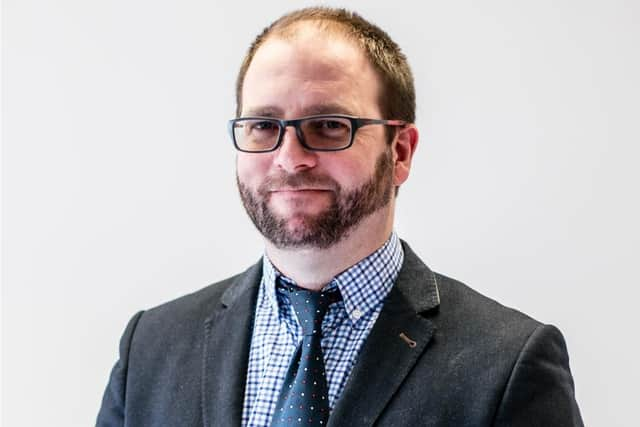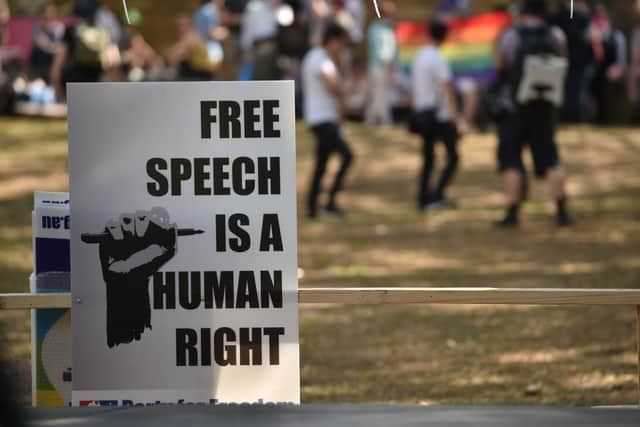Curbs on people's right to preach or protest in Belfast come amid 'avalanche' of attacks on free speech across the UK says lawyer
and live on Freeview channel 276
Michael Phillips, a consultant to the Christian Legal Centre, told the News Letter that if the planned permit system was really just about curbing loud activities in public, then the council could pass a bye-law to that effect.
He is concerned that instead the move is part of a general clampdown on people's right to free expression across the UK.
Advertisement
Hide AdAdvertisement
Hide AdThe permit rules are now out to consultation by Belfast City Council.


In short, they mean that anyone using an amplification device to protest or preach in the main shopping district will have to buy a permit.
The same applies if someone - a campaign group or political party - wants to set up a stall to hand out leaflets.
The permits would entitle them to do so for a maximum of two hours, after which they must pack up their belongings and move 100 metres to a new location, and set up again there.
Advertisement
Hide AdAdvertisement
Hide AdThe cost of the permits has not been determined yet. It is also not known if councillors or officials will be the ones to issue them.


Breaking these planned rules can land you with a £500 fine.
The permit rules would also give the council the power to impose unspecified “conditions” on permit holders, which it can change at any time.
The permit system would also restrict buskers and other street entertainers who use amplification, limiting them to one hour in any given spot.
Mr Phillips told the News Letter that, in his eyes, "freedom of speech and freedom of religion are basically good things".
Advertisement
Hide AdAdvertisement
Hide Ad"Inevitably there are going to be some people who are a little bit egregious, difficult, offensive, I totally understand that," he said.
"But it's a small price to pay for democracy.
"In England, what was a very occasional interference by police with street preachers, evangelists, pro-life supporters et cetera about 15 years ago has turned into an avalanche now, with prosecutions, arrests, public spaces protection orders (PSPOs): it's been a deluge.
"So the fear is that what may seem quite reasonable gets abused.
"I may not like the Hare Krishnas as I'm walking down the street, because I don't agree with their message and I don't like their music. But if they're banned, then I'm going to be banned.
Advertisement
Hide AdAdvertisement
Hide Ad"When there's people who feel aggrieved - about veganism, Hamas, Israel, whatever – they've got a perfect right to go out there and create much noise.
"I don't want that. But what's good for the goose is good for the gander, and you've just got to suck it up in a democracy."
It was put to him that the public may be supportive of the idea of curbing loud amplification on the streets.
"That's how it's always sold," he replied.
"The PSPOs that we've seen brought in with the Crime and Anti-Social Behaviour Act of 2014, that's what they started out on: dog poop, noise amplification – but there's been a creep.
Advertisement
Hide AdAdvertisement
Hide Ad"So what we're now starting to see happen are speech codes being introduced. And that's the ultimate destination that we're heading to: if you offend people, you get arrested.
"The police of Merseyside actually put up a poster saying 'to offend is an offence'! The whole essence of freedom of speech is you should be able to offend people.
"If it was just about decibels, that could be dealt with by way of a bye-law or a PSPO – you don't need permits with that."
Details of how to respond to the consultation are on the council website.
Advertisement
Hide AdAdvertisement
Hide AdThe News Letter has also asked the main churches in Northern Ireland about their stances on the planned permit system.
The Presbyterian Church in Ireland said: “We are aware of the proposed draft bye-laws and their potential implications for different people in the city centre, and will consider responding to the public consultation before it closes on 4 March 2024.”
The Catholic Diocese of Down and Connor replied: “The introduction of any new bye-laws would need to be compatible with the provisions of the European Convention on Human Rights (ECHR) and the Equality Act 2010 which legally protect people from discrimination in the workplace and wider society, particularly in relation to the Human Right to freedom of religion.
"The Diocese will take time to consider in detail the council’s proposal and the implications of these bye-laws before making a submission to the consultation.”
The Church of Ireland said: “We have no comment to make.”
No response had been received from the Methodists at time of writing.